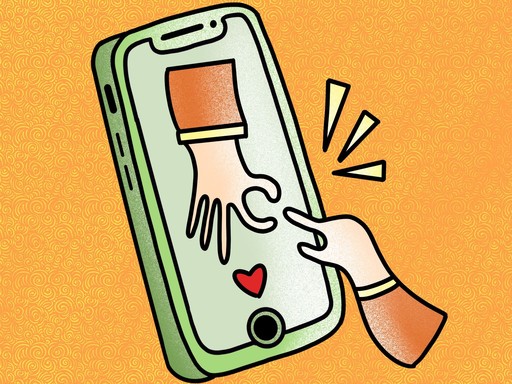
By Dan King and Isabelle Walker
Online dating is a minefield. At its best, it can be an exciting way to meet people, at its worst it can be a wild west of unwanted explicit messages from strangers, and the source of the majority of screenshots on your group chats. But whether you’re having trouble pulling a 10 on Tinder, finding hotties on Hinge, or are bored of Bumble, we’ve explored some of the more alternative dating apps out to see how they compare. You’re welcome.
Our scale explained
Inclusivity: Whether the gender and sexuality options go outside the male/female binary.
Navigation: How easy the app is to use.
Personalisation: The scope of how much you can add to your profile e.g. interests, prompts.
Cost: The price of the app, and whether you can use it without paying a subscription.
Safety: If the app makes users verify their photos, how much of your information you can keep private e.g. your exact location (I’m looking at you, Happn)
Happn
Inclusivity 3/5, Navigation 2/5, Personalisation 4/5, Cost 3/5, Safety 0/5
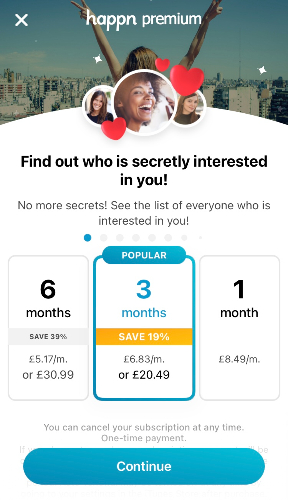
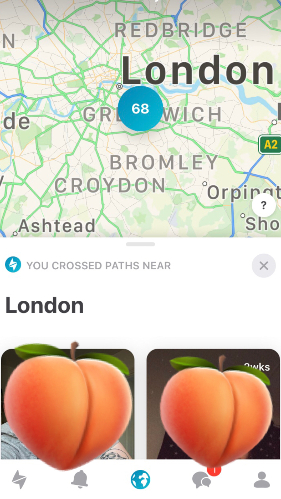
Dan: If Joe from Netflix’s You had one dating app, it would be Happn. It taps into a “rush-hour crush” generation and romanticises temporary moments of attraction between strangers. The app sends you a notification if you pass someone else who has Happn downloaded, meaning that those fleeting attractions need not be so, well, fleeting. The problem is, the map feature extends to show how far away people that you’re swiping on are away from you “right now”. This feels incredibly invasive, and is nothing short of a stalker’s wet dream.
Isabelle: Even though Happn doesn’t show your current location all the time, I agree with Dan on this one; it’s just creepy as fuck. That guy who was staring at you on the train home? If he has Happn, he now has access to your profile. You can accept or decline messages, but it’s still a bit weird. I think in an ideal world it could be great, but in practice, strangers having access to your location is just not a good idea. It does have scope for personalisation, allowing you multiple pictures, a list of lifestyle question prompts, a bio, and the pièce de résistance: Your location. Suffice to say I will not be paying £8.49 a month for this season’s stalker must-have.
Elate
Personalisation 4/5, Inclusivity 5/5, Cost 5/5, Navigation 4/5, Safety 5/5
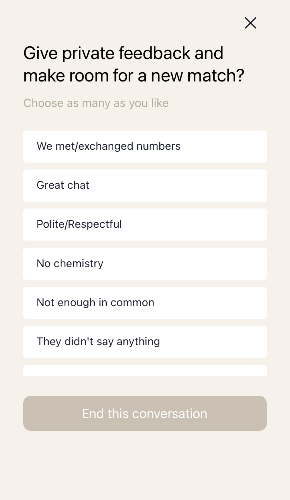
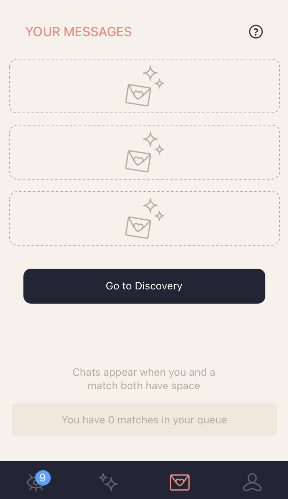
Isabelle: Elate markets itself as an anti-ghosting dating app, as you can only talk to three people at a time, meaning you have to clear conversations in order to access other matches. It encourages you to fill out every section of your profile in order to get more matches, which is great for users like me who masquerade as mysterious, when really we’re just lazy. It feels like a very personality-based dating app, which I like; but if you’re in search of a smash-and-dash situation, I’d look elsewhere.
Dan: As someone who has loads of half-hearted chats on the go at once, Elate is the nudge I need to be proactive and actually invest in the conversations I’m having. The “feed” section shows you elements of other user’s profiles, like images or prompt answers, but no names. You can then react to so the algorithm can improve your matches which sounds great but it is a bit strange not knowing who you’re reacting to.
Pickable
Inclusivity 0/5, Navigation 0/5, Personalisation 0/5, Cost 1/5, Safety 2/5
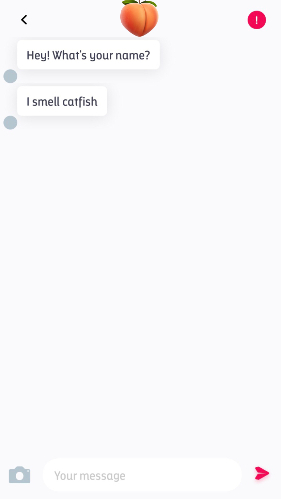
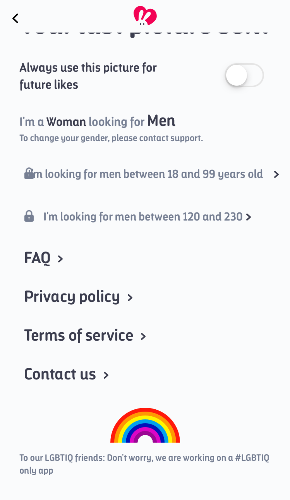
Isabelle: Wow, I hate this app with a passion. It’s meant to “protect” women by making them anonymous with no photos, which seems counterintuitive. At best it’s a few decades out of date, and at worst, misogynistic. Women are encouraged to send a picture when liking someone to increase the chances of matching, but it basically forces you to match with people you don’t like at first. You can’t change your age settings until you’ve “picked more guys” – so I had to begrudgingly “like” a bunch of random people who were clearly twice my age; just so I could test out the app. To add insult to injury, the only options for gender are male and female, and the only option for sexuality is straight. But don’t worry! They apparently have an “LGBTIQ only” app coming out soon (*rolls eyes*). Don’t let the bunny logo fool you: there’s nothing cute about this one.
Dan: My advice to anyone downloading Pickable is simple: don’t. Even as a joke, even if there’s a fire. It doesn’t give you the option of showing much information about yourself – you’re limited to one photo, your name, height, and a bio. Every 24 hours, women can “like” you and send a chat request; but their photos are often blurred or not shown at all, so you have no idea who you are talking to. The first three chat requests I received were from accounts which were clearly fake, one of which was a naked picture. They all opened with the exact same line: “Hey! What’s your name?”. The app is almost unusable without paying an eye-watering £29.99 a month for the full version. Pickable: it’s not me, it’s you.
CLiKD
Personalisation 4/5, Inclusivity 5/5, Cost 1/5, Navigation 2/5, Safety 5/5
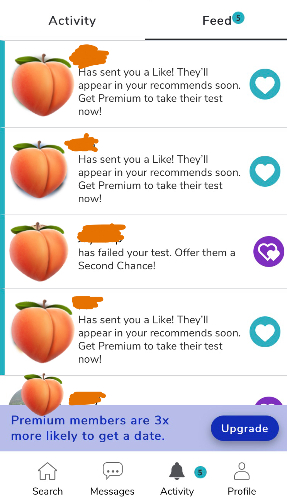
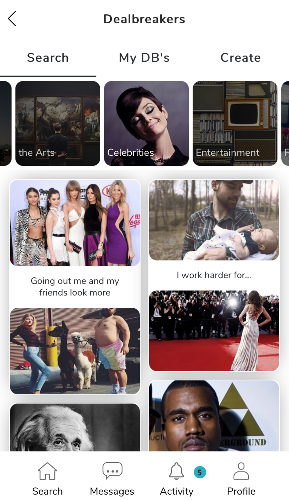
Isabelle: CLiKD is reminiscent of the Pinterest sign-up page, where you have to choose your interests from the get-go. You select “dealbreakers” from an unnecessarily wide selection of options, some of which I wasn’t entirely sure made sense. It felt like I was being tested; to match with someone, you have to get at least two of the other person’s “dealbreakers” correct. Talk about a dating game. It was difficult to get any matches without jumping through hoops. It was very inclusive however, with a lot of gender and sexuality options, but I just couldn’t get with the navigation. Sorry CLiKD; we’re going to have to call it off.
Dan: CLiKD is one of those dating apps where if you don’t want to pay for the premium subscription, you may as well not bother. Its constant prompts to upgrade were irritating, although I think I’d put up with it to avoid paying the £14.49 a month subscription. Talk about click-bait.
Monet
Personalisation 4/5, Inclusivity 5/5, Cost 5/5, Navigation 4/5, Safety 5/5
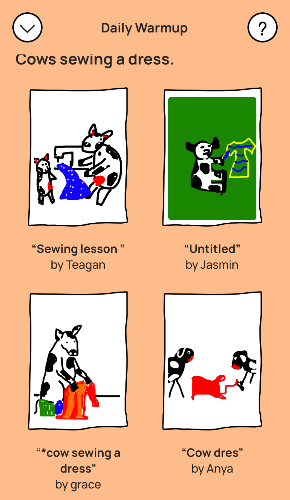
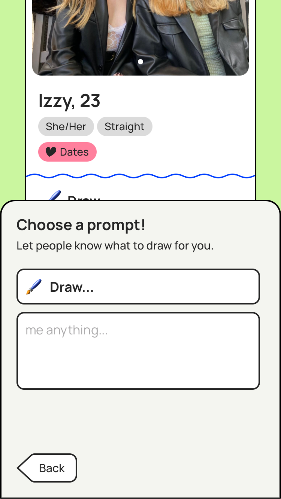
Isabelle: I loved the wholesome feel of Monet, as its USP involves sending drawings to start a conversation with matches. You give other users drawing prompts (mine is currently “draw a cat” – ambitious I know) and you can see other users’ submissions to the “daily warm-up” drawing prompt. Today’s was: “cows sewing a dress” which was cute. Not exactly sexy, though.
Dan: Monet is a very inclusive app, with a non-exhaustive list of options for both gender and sexuality given when signing up. I definitely got distracted by the drawing element though, and at times completely forgot that this was actually a dating app. I liked that it gives you the opportunity to meet people either locally, globally or from your university as a free feature, which is not usually offered by other apps.
The choice of dating apps out there can feel as overwhelming as the choice of single strangers available to meet. But sliding into DMs, for better or worse, is a trend that is here to stay, especially after a year in and out of lockdown. And current research predicts that by 2035, more people will meet their partner online than offline. Hopefully one of these apps can help you contribute to that statistic, so get swiping!
